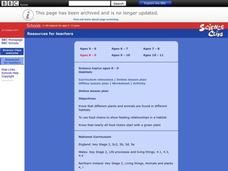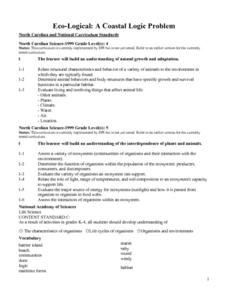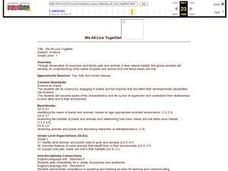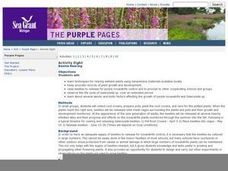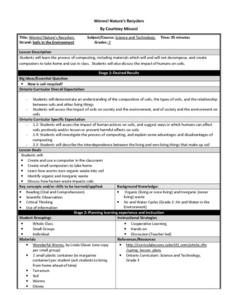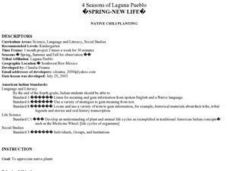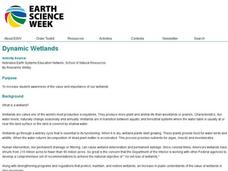WK Kellogg Biological Station
Sounds of Selection
Do you want a creative and fun way to teach about natural selection? Hop to it by turning your middle school princes and princesses into frogs trying to catch as many bugs as possible in a Hungry Hungry Hippos style game. For high...
Curated OER
Getting a Handle on Your Bee
Students observe dried bees, carefully glue them to toothpicks, and use them for cross pollinating their Brassica plants. They also describe reasons why two similar investigations can produce different results. Finally, students...
Curated OER
Habitats
Learners investigate the habitats of living things and the cycle of the food chain. In this scientific inquiry online instructional activity, students examine the habitats of plants and animals as well as the food chain as they sort...
Curated OER
Eco-Logical: A Coastal Logic Problem
Fourth graders study the characteristics of five coastal communities. They use logic cards and matching activities to identify the proper community for plant and animal species.
Curated OER
Teeth and Eating
Students explore animal diets and teeth. In this animal science lesson, students view photos of animals and their teeth. Students identify the type of diet the animal has based on the teeth. Students are introduced to the terms...
Virginia Department of Education
Weather Patterns and Seasonal Changes
Get your class outside to observe their surroundings with a lesson plan highlighting weather patterns and seasonal changes. First, learners take a weather walk to survey how the weather affects animals, people, plants, and trees during...
Science 4 Inquiry
The Ins and Outs of Photosynthesis
The most important chemical process on Earth is photosynthesis. Scholars explore the changes in the gases in our atmosphere as life on Earth developed. They create a model of photosynthesis and consider simple questions.
Core Knowledge Foundation
A Time for All Seasons - Fall
The weather is cooling down and the leaves are starting to change color; fall is right around the corner. Celebrate this special time of year with this earth and life science lesson series that teaches children about the causes of...
Core Knowledge Foundation
A Time for All Seasons - Summer
The sun is shining and the birds are singing, what better time to teach young learners about the fun season of summer. In this week-long science series, children learn how the rotation and orbit of the earth influence the days and...
Core Knowledge Foundation
A Time for All Seasons - Winter
As the days get shorter and a chill enters the air, it's time to start teaching your little ones about the wondrous winter season. Through a series of teacher demonstrations, whole-class read alouds and discussions, and hands-on...
Desert Museum
Daisy Ecology
Here's a fine lesson that combines poetry with life sciences. Learners carefully listen to a poem that's all about a food chain. As the poem is read, learners name the producer, the herbivore, the carnivore, and the omnivore. Lots of...
Curated OER
We All Live Together
First graders examine the lifestyle of classroom and family pets in their natural habitat. They determine the needs of plants and animals, and how those needs are met. They listen to read alouds, sing songs, and draw using computer based...
Curated OER
Costa Rican Food Chain
Discuss the animals and plants in the rainforest food chain using this activity. Learners talk about and do research on the top predators from the Costa Rican region and create a model of one of them in class. They also make a visual...
Curated OER
Dinosaurs
Students are introduced to the various types of dinosaurs and write in their journals about their favorite one. After listening to a story and watching a filmstrip, they color a few pages in their Dinosaur Friends Book. They also examine...
Curated OER
Beetle Rearing
Students investigate plants and the effects beetles have on the plants. In small groups, they collect plants and observe the beetles as they interact with the plants. They record the conditions including temperature, cloudiness, length...
Curated OER
Worms, Nature's Recyclers!
Students study what worms need to survive in different environments. They study how worm composting improves soil and reduce waste. They discuss composting techniques and present a puppet show about a worm's life.
PBS
Season Seeking
It's a time of change. A hands-on activity engages young scientists in a lesson highlighting the change of seasons. They brainstorm indicators of season changes in nature and then look for them. Next, they record observations in a field...
Curated OER
WET Science Lesson #11: How Light Affects Water
Scientists listen to the story of Wadja Egnankou who works to save African mangrove forests. They experiment with refraction and the introduction of particulate matter to water. They conclude with creative writing about the need for a...
Curated OER
Native Chili Planting
Students discover the process of planting chili. After comparing two types of seeds students plant and with the use of a digital camera, record the seed progress. When ready for transplant, students take young plants to a retirement...
Curated OER
Dynamic Wetlands
Students construct and observe a model of two different types of wetlands. In this wetlands lesson, students create a model of a wetland with constant drainage and a wetland that maintains a well-saturated soil. Students observe and...
Curated OER
Diurnal Cycling Experiments
Students carry out an experiment to monitor diurnal fluctuations in dissolved oxygen, carbon dioxide, pH, and water temperature. They determine the CO2 and pH of the samples (and optionally, dissolved oxygen). Students complete their...
Core Knowledge Foundation
A Time for All Seasons - Spring
Celebrate the arrival of spring with this fun primary grade science unit. Engaging young scientists with a variety of hands-on activities and inquiry-based investigations, these lessons are a great way to teach children about seasonal...
Rainforest Alliance
Investments in Forest Carbon
One hundred metric tons of CO2 can accumulate in one acre of forest over time—that's a lot of carbon! In the activity, groups of middle school learners determine what makes forests important. They then solidify the concept by using a...
Curated OER
Dissolved Oxygen Lesson
Learners investigate what dissolved oxygen is and why it is important to aquatic life and what factors influence levels of dissolved oxygen in a lake. They study how to use MS Excel to make charts to show trends and correlations.




